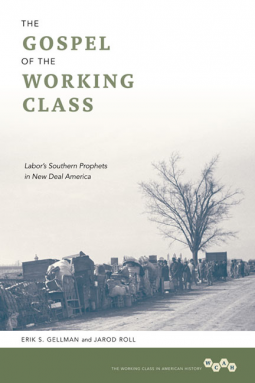
The Gospel of the Working Class
Labor's Southern Prophets in New Deal America
by Erik S. Gellman and Jarod Roll
This title was previously available on NetGalley and is now archived.
Buy on Amazon
Buy on BN.com
Buy on Bookshop.org
*This page contains affiliate links, so we may earn a small commission when you make a purchase through links on our site at no additional cost to you.
Send NetGalley books directly to your Kindle or Kindle app
1
To read on a Kindle or Kindle app, please add kindle@netgalley.com as an approved email address to receive files in your Amazon account. Click here for step-by-step instructions.
2
Also find your Kindle email address within your Amazon account, and enter it here.
Pub Date Jun 28 2011 | Archive Date Sep 01 2012
Description
In this
exceptional dual biography and cultural history, Erik S. Gellman and
Jarod Roll trace the influence of two southern activist preachers, one
black and one white, who used their ministry to organize the working
class in the 1930s and 1940s across lines of gender, race, and
geography. Owen Whitfield and Claude Williams, along with their wives
Zella Whitfield and Joyce Williams, drew on their bedrock religious
beliefs to stir ordinary men and women to demand social and economic
justice in the eras of the Great Depression, New Deal, and Second World
War.
Williams and Whitfield preached a
working-class gospel rooted in the American creed that hard, productive
work entitled people to a decent standard of living. Gellman and Roll
detail how the two preachers galvanized thousands of farm and industrial
workers for the Southern Tenant Farmers Union and the Congress of
Industrial Organizations. They also link the activism of the 1930s and
1940s to that of the 1960s and emphasize the central role of the
ministers' wives, with whom they established the People's Institute for
Applied Religion.
This detailed narrative
illuminates a cast of characters who became the two couples' closest
allies in coordinating a complex network of activists that transcended
Jim Crow racial divisions, blurring conventional categories and
boundaries to help black and white workers make better lives. In
chronicling the shifting contexts of the actions of Whitfield and
Williams, The Gospel of the Working Class situates Christian
theology within the struggles of some of America's most downtrodden
workers, transforming the dominant narratives of the era and offering a
fresh view of the promise and instability of religion and civil rights
unionism.
Erik S. Gellman is an assistant professor of history at Roosevelt University in Chicago. He is the author of Death Blow to Jim Crow: The National Negro Congress and Militant Civil Rights. Jarod Roll
teaches American history at the University of Sussex, England, where he
directs the Marcus Cunliffe Centre for the Study of the American South.
He is the author of the award-winning Spirit of Rebellion: Labor and Religion in the New Cotton South.
Advance Praise
"A
must read for today: two activists, one black, one white, organize
America's laboring poor through a powerful social gospel to confront
racism and economic injustice in the Great Depression and World War II
era."--Reverend Calvin S. Morris, Executive Director, Community Renewal
Society
"This is the story of heroic people,
black and white, who tried to democratize the southeastern states of the
USA in the years before Dr. King and the Warren Court."--Pete Seeger
"This
outstanding and impressively researched study reveals the tremendous
significance of Claude Williams and Owen Whitfield, two major figures in
the efforts to organize southern black and white workers. Erik S.
Gellman and Jarod Roll also show the significance of religion in
southern working class history. There have been other studies of various
religious figures who worked for social justice in the South during
this era, but this is the finest one that I have read."--Nan Elizabeth
Woodruff, author of American Congo: The African American Freedom Struggle in the Delta
Available Editions
| EDITION | Paperback |
| ISBN | 9780252078408 |
| PRICE | $30.00 (USD) |
| PAGES | 248 |



